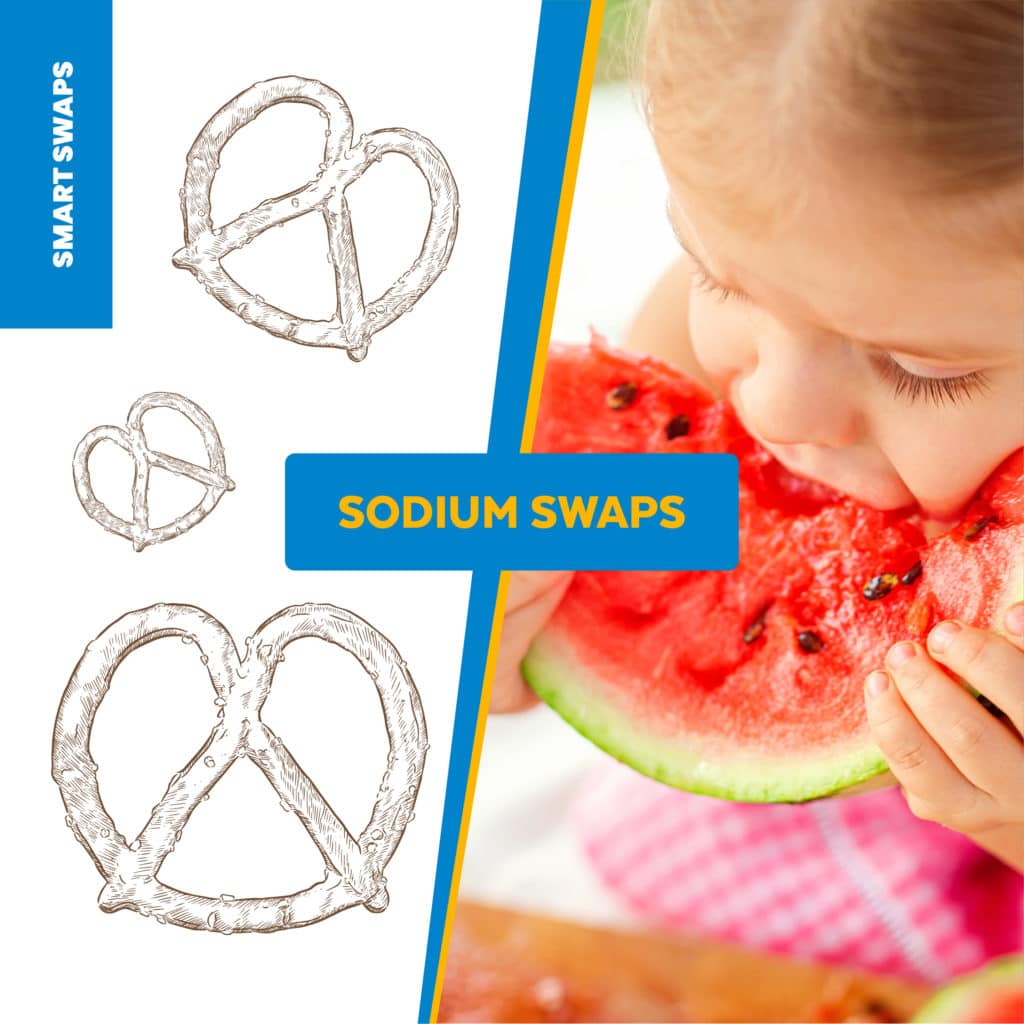If you are looking for a smart sodium swap, here is one for you:
While Pretzel has 1240mg of Sodium, Watermelon has only 1mg.
In general, steering clear of potato chips, pretzels, and other savory snacks is the best way to trim salt from your diet.
Pretzels are one of the top 10 sources of sodium in the average American's diet.
| Reading food labels: Checking for sodiumTo assess a food's sodium level, check the back and sides as well as the front of the package or container. The label may offer a clue (see below for a translation of what the terms mean). But the actual amount is listed in the Nutrition Facts panel found on the product's back or side. | |
| IF THE LABEL SAYS: | IT MEANS: |
| Sodium-free or salt-free | Less than 5 mg sodium per serving |
| Very low sodium | Less than 35 mg sodium per serving |
| Low sodium | Less than 140 mg sodium per serving |
| Light in sodium | At least 50% less sodium than original product |
| Reduced sodium | At least 25% less sodium than original product |
Protect yourself from the damage of chronic inflammation.
Science has proven that chronic, low-grade inflammation can become a silent killer contributing to cardiovascular disease, cancer, type 2 diabetes, and other conditions.
The average adult eats about 3,400 milligrams (mg) of sodium per day, far more than the recommended daily goal of 2,300 mg. The American Heart Association recommends an even lower goal: no more than 1,500 mg per day, especially for those with high blood pressure, chronic kidney disease, or heart disease.
Let's swap savory snacks for a low- or reduced-sodium choice: a fresh and tasty slice of watermelon?
Is watermelon safe for a kidney diet?
A healthy kidney diet is very different based on your diagnosis, stage of kidney disease, labs, and other factors in the medical history.
The main reason why watermelon is good for kidney disease is that it is simply a fruit! People who eat plenty of fruits and vegetables tend to have better blood control, lower acid levels, and a slower progression of kidney disease.
Nutritionally, watermelon is a good source of vitamin C, beta carotene, and lycopene, a phytochemical with antioxidant activity that may protect against cancer. When consumed in small portions, it is also low in potassium and naturally very low in phosphorus and sodium.
While watermelon is an excellent choice for a renal diet, we need to consider three factors: portion size, potassium, and fluid.
- Portion: The typical portion is a watermelon wedge equal to about 3 cups. For a dialysis diet that includes limited potassium and fluid, a wedge of watermelon contributes too much potassium and fluid. Most dietitians advise limiting watermelon to a 1 cup serving. Instead of cutting a wedge, cut the watermelon into bite-size pieces and measure into a cup.
- Potassium: Knowing how many fruits and vegetables to eat and the best portion size is essential to controlling potassium intake. A wedge of watermelon contributes 560 mg potassium approximately, but a smaller 1 cup serving contains only 180 mg of potassium. Since a one-cup portion of watermelon is smaller than a typical portion, try measuring your servings until you can successfully guesstimate a 1 cup portion. You can also cut your portion into small triangular pieces, as sometimes seen when watermelon is placed on a salad bar or used as a garnish. Most other melons are much higher in potassium compared to watermelon. For this reason, watermelon is usually the only melon included in a low potassium diet plan.
- Fluid: It is easy to exceed your fluid goals if you do not count watermelon as part of your fluid intake. That is because watermelon is 92% fluid and has little fiber. A wedge of watermelon has close to 3 cups of fluid! For dialysis patients on a fluid restriction,
watermelon is limited to 1 cup and may be counted as a replacement for fluid if water weight gains are a concern.
If you are looking for watermelon recipes, you can try the Kidney-Friendly Watermelon Power smoothie recipe.
Disclaimer: This article is for informational purposes only and is not intended to be a substitute for medical advice or diagnosis from a physician.
-Ask your nephrologist and renal dietitian before preparing and consuming this recipe. Every person has different needs.-

